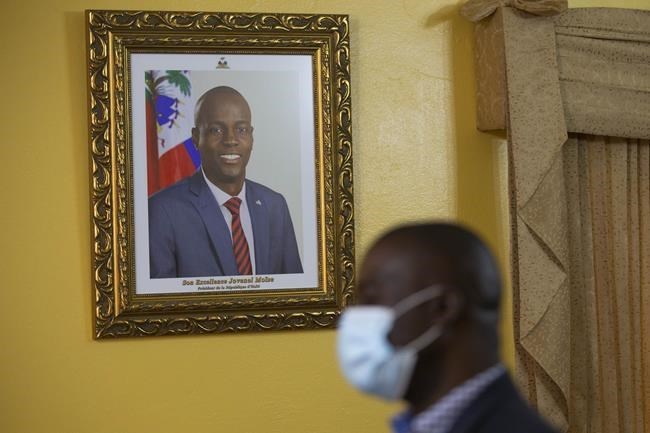PORT-AU-PRINCE, Haiti (AP) — Haiti's prime minister said Tuesday that he plans to hold a referendum to modify the country's constitution by February, and he hopes to organize presidential and legislative elections early next year.
In an interview with The Associated Press, Ariel Henry dismissed opponents who accuse him of wanting to stay in power and said that mistrust is one of the biggest challenges he faces.
The referendum is a priority, Henry said, because the current constitution is rejected by a majority of political figures and civil society leaders. He said an electoral council that will be responsible for setting dates has yet to be named after he recently dissolved the previous provisional council.
“The elections must be held as soon as possible,” he said as he lamented the lack of trust among Haitians. “People don't believe what is being said.”
After being postponed several times this year, presidential and legislative elections were scheduled to be held Nov. 7, along with the constitutional referendum. But the assassination of President Jovenel Moïse at his private home on July 7 upended those plans.
One proposed constitutional change would bar a president from serving more than two terms, although it does not specify whether those would be consecutive, as stated in the current constitution. Other changes include compulsory military service for those age 18, the creation of a vice presidential position to replace that of prime minister and establishing a unicameral legislature to replace the current Senate and Chamber of Deputies.
Thousands protested in the streets when the referendum was first proposed, with many accusing Moïse of a power grab.
Henry still faces opposition to the referendum, as well as criticism from those who do not consider him a legitimate leader because he was first recognized as prime minister by the Core Group, composed of ambassadors from Germany, Brazil, Canada, Spain, the U.S., France, the European Union and representatives from the United Nations and the Organization of American States.
“He's a puppet,” said Monique Clesca, a Haitian writer, activist and former U.N. official. “Bottom line, he has no legitimacy or credibility.”
Clesca and several leaders of Haiti's civil society are calling for a two-year transitional government with a president and prime minister chosen by political parties and civil society to stabilize the country before holding elections.
“We have wanted a Haitian solution," she said. “It is time that the international community says to us, ‘We are listening,’ rather than push down our throat somebody that they put there.”
Henry said he has always been a legitimate prime minister despite not being elected, noting that Moïse chose him shortly before being killed. He views his position as a mission to oversee a renaissance of Haitian society.
In other comments, Henry criticized how the U.S. government recently treated Haitian migrants along the U.S.-Mexico border, where it expelled more than 2,300. He said that action was not “suitable.”
“We don’t understand the way that our compatriots were treated,” he said.
Henry’s remarks came just hours before the arrival in Port-au-Prince of Assistant Secretary of State Brian Nichols, the top U.S. diplomat to Latin America, who is seeking to contain the fallout from the abrupt resignation last week of the U.S. special envoy to Haiti.
Daniel Foote, a career diplomat, quit the high-profile post over the deportations at the border, saying it was inhumane to return the migrants, many of whom fled the island following the devastating 2010 earthquake, to a country buffeted by gang violence, a collapsed economy and political turmoil.
Foote, in his resignation letter, also criticized the U.S. for standing by what he considers a “corrupt government with gang alliances” instead of embracing a broad-based coalition of civil society groups that have come up with their own blueprint for stabilizing the country.
Henry declined to comment on Foote’s resignation, saying it was a foreign affair, but he said he does not think the situation will affect the relationship between the U.S. and Haiti, which he said would continue and deepen.
Henry added that the government is working on a draft of a potential program to help the thousands of migrants who have been expelled. He said one proposal is to give the migrants access to credit so they can launch their own small businesses.
“We’re trying to do that immediately,” he said.
Another priority is to find the masterminds behind Moïse’s killing. Henry said he does not know why the president was slain. He also dismissed allegations made by a chief prosecutor — whom he fired — that there were two phone calls between him and a key suspect just hours after the assassination.
Henry said he has no recollection of speaking with Joseph Badio, who was fired from the government’s anti-corruption unit in May and remains a fugitive, according to police, who seek him on charges including murder.
“If that conversation took place, I do not remember it,” he said. “For me, that conversation never happened.”
Henry said he dismissed Port-au-Prince’s chief prosecutor, Bed-Ford Claude, and former Justice Minister Rockfeller Vincent, because they did not respect the law and tried to politicize the situation.
“They don’t have any ethics, and they are not credible,” he said.
___
Coto reported from San Juan, Puerto Rico. Goodman reported from Washington.
Dánica Coto, Joshua Goodman And Pierre-richard Luxama, The Associated Press

